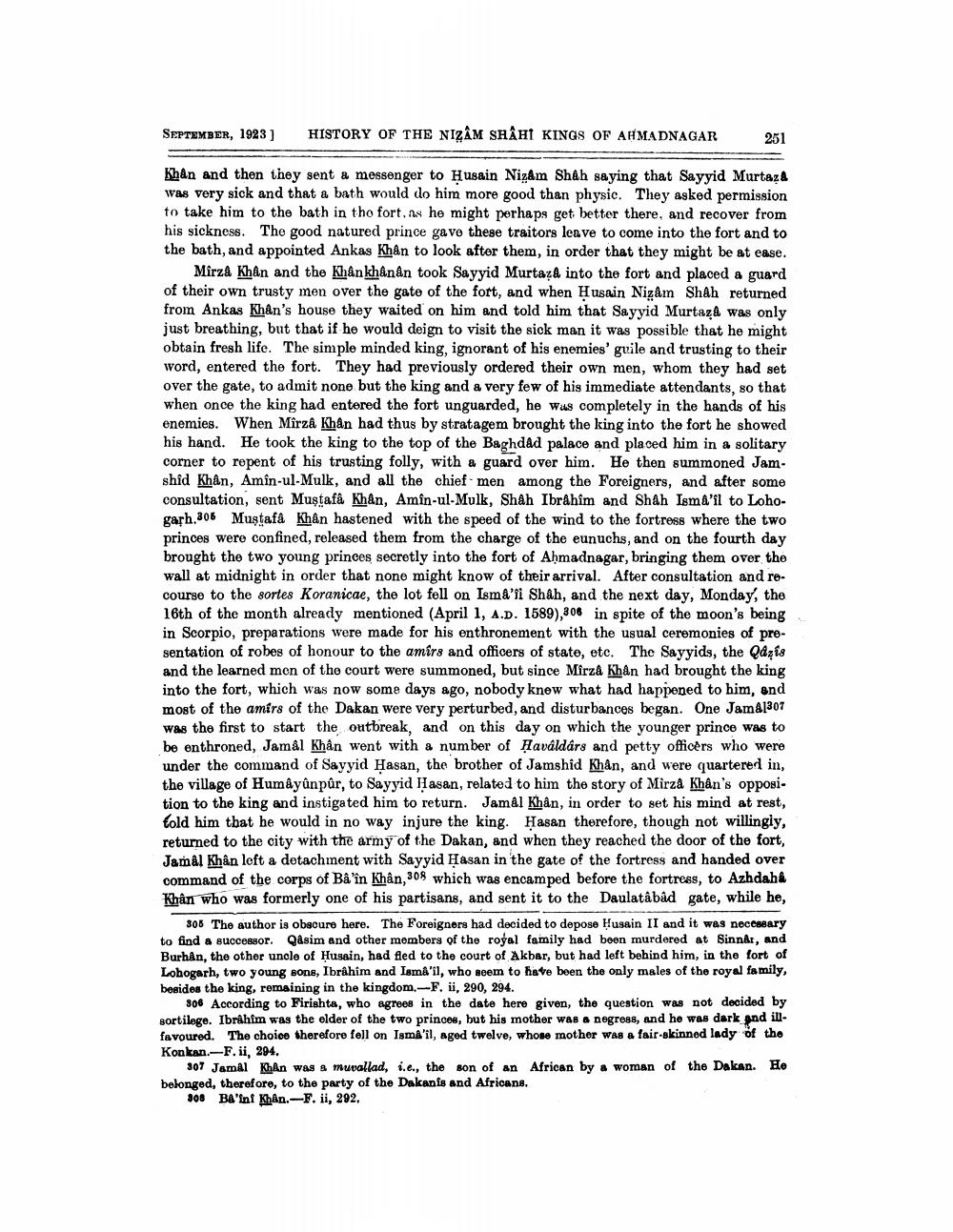________________
SEPTEMBER, 1923)
HISTORY OF THE NIZAM SHAH KINGS OF AHMADNAGAR
251
Khan and then they sent a messenger to Husain Nizam Shah saying that Sayyid Murtaza Was very sick and that a bath would do him more good than physic. They asked permission to take him to the bath in tho fort, as he might perhaps get better there, and recover from his sickness. The good natured prince gave these traitors leave to come into the fort and to the bath, and appointed Ankas Khan to look after them, in order that they might be at ease.
Mirza Khan and the Khân khanan took Sayyid Murtaza into the fort and placed a guard of their own trusty men over the gate of the fort, and when Husain Nizam Shah returned from Ankas Khan's house they waited on him and told him that Sayyid Murtaza was only just breathing, but that if he would deign to visit the sick man it was possible that he might obtain fresh life. The simple minded king, ignorant of his enemies' guile and trusting to their word, entered the fort. They had previously ordered their own men, whom they had set over the gate, to admit none but the king and a very few of his immediate attendants, so that when once the king had entered the fort unguarded, he was completely in the hands of his enemies. When Mirza Khan had thus by stratagem brought the king into the fort he showed his hand. He took the king to the top of the Baghdad palace and placed him in a solitary corner to repent of his trusting folly, with a guard over him. He then summoned Jamshid Khan, Amîn-ul-Mulk, and all the chief men among the Foreigners, and after some consultation, sent Mustafa Khan, Amin-ul-Mulk, Shah Ibråhim and Shah Isma'il to Lohogaph.306 Mustafa Khan hastened with the speed of the wind to the fortress where the two princes were confined, released them from the charge of the eunuchs, and on the fourth day brought the two young princes secretly into the fort of Ahmadnagar, bringing them over the wall at midnight in order that none might know of their arrival. After consultation and recourse to the sortes Koranicae, the lot fell on Isma'ii Shah, and the next day, Monday, the 16th of the month already mentioned (April 1, A.D. 1589),806 in spite of the moon's being in Scorpio, preparations were made for his enthronement with the usual ceremonies of presentation of robes of honour to the amirs and officers of state, etc. The Sayyids, the Qazis and the learned men of the court were summoned, but since Mirza Khan had brought the king into the fort, which was now some days ago, nobody knew what had happened to him, and most of the amirs of the Dakan were very perturbed, and disturbances began. One Jam&1307 was the first to start the outbreak, and on this day on which the younger prince was to be enthroned, Jamal Khân went with a number of Havaldárs and petty officers who were under the command of Sayyid Hasan, the brother of Jamshid Khan, and were quartered in, the village of Humâyûnpûr, to Sayyid Hasan, related to him the story of Mirza Khan's opposition to the king and instigated him to return. Jamal Khan, in order to set his mind at rest, told him that he would in no way injure the king. Hasan therefore, though not willingly, returned to the city with the army of the Dakan, and when they reached the door of the fort, Jamal Khân left a detachment with Sayyid Hasan in the gate of the fortress and handed over command of the corps of Bå 'in Khân, 308 which was encamped before the fortress, to Azhdaha Khan who was formerly one of his partisans, and sent it to the Daulatâbâd gate, while he,
306 The author is obscure here. The Foreigners had decided to depose Husain II and it was necessary to find a successor. Qasim and other mombers of the royal family had boon murdered at Sinnar, and Burhån, the other unolo of Husain, had fled to the court of Akbar, but had left behind him, in the fort of Lohogarh, two young bons, Ibrahim and Isma'il, who seem to have been the only males of the royal family, besides the king, remaining in the kingdom.-F. ii, 290, 294.
806 According to Firishta, who agrees in the date here given, the question was not decided by Bortilage. Ibrahim was the elder of the two princes, but his mother was a nogress, and he was dark and illfavoured. The choice therefore fell on Isma'il, aged twelve, whose mother was a fair-skinned lady of the Konkan.-F. ii, 294.
307 Jamal Khan was a muvallad, i.e., the son of an African by a woman of the Dakan. He belonged, therefore, to the party of the Dakanis and Africans.
306 BA'inf Khân.-F. ii, 292,




